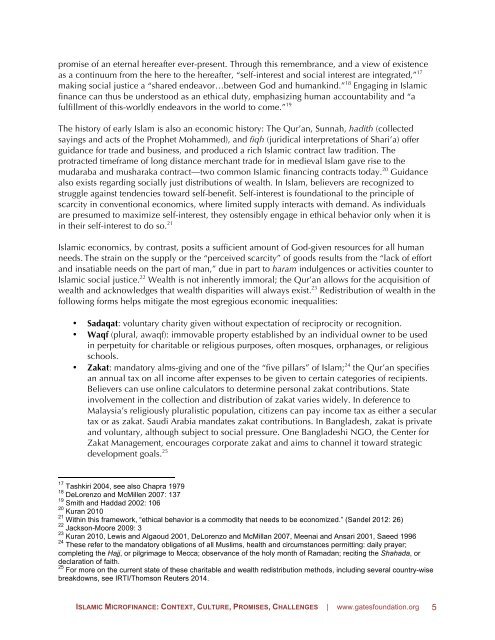ISLAMIC (MICRO)FINANCE
TrYIw
TrYIw
You also want an ePaper? Increase the reach of your titles
YUMPU automatically turns print PDFs into web optimized ePapers that Google loves.
promise of an eternal hereafter ever-present. Through this remembrance, and a view of existence<br />
as a continuum from the here to the hereafter, “self-interest and social interest are integrated,” 17<br />
making social justice a “shared endeavor…between God and humankind.” 18 Engaging in Islamic<br />
finance can thus be understood as an ethical duty, emphasizing human accountability and “a<br />
fulfillment of this-worldly endeavors in the world to come.” 19<br />
The history of early Islam is also an economic history: The Qur’an, Sunnah, hadith (collected<br />
sayings and acts of the Prophet Mohammed), and fiqh (juridical interpretations of Shari’a) offer<br />
guidance for trade and business, and produced a rich Islamic contract law tradition. The<br />
protracted timeframe of long distance merchant trade for in medieval Islam gave rise to the<br />
mudaraba and musharaka contract—two common Islamic financing contracts today. 20 Guidance<br />
also exists regarding socially just distributions of wealth. In Islam, believers are recognized to<br />
struggle against tendencies toward self-benefit. Self-interest is foundational to the principle of<br />
scarcity in conventional economics, where limited supply interacts with demand. As individuals<br />
are presumed to maximize self-interest, they ostensibly engage in ethical behavior only when it is<br />
in their self-interest to do so. 21<br />
Islamic economics, by contrast, posits a sufficient amount of God-given resources for all human<br />
needs. The strain on the supply or the “perceived scarcity” of goods results from the “lack of effort<br />
and insatiable needs on the part of man,” due in part to haram indulgences or activities counter to<br />
Islamic social justice. 22 Wealth is not inherently immoral; the Qur’an allows for the acquisition of<br />
wealth and acknowledges that wealth disparities will always exist. 23 Redistribution of wealth in the<br />
following forms helps mitigate the most egregious economic inequalities:<br />
• Sadaqat: voluntary charity given without expectation of reciprocity or recognition.<br />
• Waqf (plural, awaqf): immovable property established by an individual owner to be used<br />
in perpetuity for charitable or religious purposes, often mosques, orphanages, or religious<br />
schools.<br />
• Zakat: mandatory alms-giving and one of the “five pillars” of Islam; 24 the Qur’an specifies<br />
an annual tax on all income after expenses to be given to certain categories of recipients.<br />
Believers can use online calculators to determine personal zakat contributions. State<br />
involvement in the collection and distribution of zakat varies widely. In deference to<br />
Malaysia’s religiously pluralistic population, citizens can pay income tax as either a secular<br />
tax or as zakat. Saudi Arabia mandates zakat contributions. In Bangladesh, zakat is private<br />
and voluntary, although subject to social pressure. One Bangladeshi NGO, the Center for<br />
Zakat Management, encourages corporate zakat and aims to channel it toward strategic<br />
development goals. 25<br />
17 Tashkiri 2004, see also Chapra 1979<br />
18 DeLorenzo and McMillen 2007: 137<br />
19 Smith and Haddad 2002: 106<br />
20 Kuran 2010<br />
21 Within this framework, “ethical behavior is a commodity that needs to be economized.” (Sandel 2012: 26)<br />
22 Jackson-Moore 2009: 3<br />
23 Kuran 2010, Lewis and Algaoud 2001, DeLorenzo and McMillan 2007, Meenai and Ansari 2001, Saeed 1996<br />
24 These refer to the mandatory obligations of all Muslims, health and circumstances permitting: daily prayer;<br />
completing the Hajj, or pilgrimage to Mecca; observance of the holy month of Ramadan; reciting the Shahada, or<br />
declaration of faith.<br />
25 For more on the current state of these charitable and wealth redistribution methods, including several country-wise<br />
breakdowns, see IRTI/Thomson Reuters 2014.<br />
<strong>ISLAMIC</strong> <strong>MICRO</strong><strong>FINANCE</strong>: CONTEXT, CULTURE, PROMISES, CHALLENGES | www.gatesfoundation.org 5


